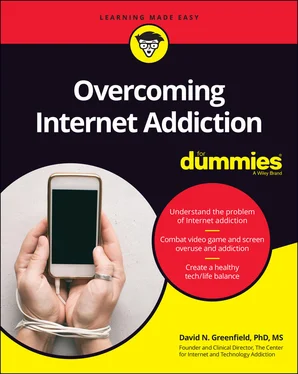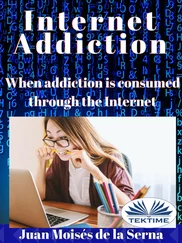 If you take away anything about Internet addiction from this book, it should be the information marked with this icon.
If you take away anything about Internet addiction from this book, it should be the information marked with this icon.
 This icon flags information that delves a little broader or deeper than usual into Internet addiction.
This icon flags information that delves a little broader or deeper than usual into Internet addiction.
 This icon highlights especially helpful advice about understanding, diagnosing, or treating Internet addiction.
This icon highlights especially helpful advice about understanding, diagnosing, or treating Internet addiction.
 This icon points out situations and actions to avoid as you work to overcome Internet addiction.
This icon points out situations and actions to avoid as you work to overcome Internet addiction.
In addition to the material in the print or ebook you’re reading right now, this product comes with some access-anywhere goodies on the web. Check out the free Cheat Sheet for information on Internet addiction basics, reasons why the Internet is addictive, diagnosing and treating an Internet addiction, and living a balanced life that includes the proper amount of screen use.
To get this Cheat Sheet, simply go to www.dummies.com and search for “ Overcoming Internet Addiction For Dummies Cheat Sheet” in the Search box.
As I mention earlier, you don’t have to read this book from cover to cover, but if you’re motivated to do so, and you want to have a thorough immersion in the subject, starting from the beginning is a good idea. If you just want to find specific information and then get back to work, look at the table of contents or the index, and then dive into the chapter or section that interests you. Sampling a topic can help you see where you might want to delve in further.
Please remember that there is hope. There is hope for people to change and for addictions to improve and be managed. Also remember that humans are unique in their ability to learn and adapt, and that the brain is neuroplastic and can change, retool, and relearn throughout your lifetime. People have an inherent desire to grow, heal, and improve, and you or your loved one are no exception. That, of course, in no way minimizes the stress and disappointment you experience when your life or your child’s life is not where you want it to be. People are capable of great change, and there are many paths to positive improvement, especially with the resources and professional help that are available. We know much more about Internet and technology addiction than we once did, and there are now many more mental health and addictions professionals today, who are trained and experienced in consulting on or treating this problem.
Part 1
Getting Up to Speed on Addiction Basics
IN THIS PART …
Look at the basic factors involved in Internet and technology addiction, and examine ways to overcome overuse and addictive use of your screens. You also find the definition of addiction, and you can check out the similarities and differences between Internet addiction and substance-based and other addictions. Lastly, you discover some of the most overused and abused forms of content on the Internet.
Examine the biological and neurobiological basis of addiction and how the reward centers in the brain are involved in the development and maintenance of an addiction. Addiction is a complex biopsychosocial problem that encompasses numerous aspects of your life.
Recognize that children and teens are perhaps more susceptible to addiction than adults. Numerous hormonal and psychological factors in the developing brain can leave children and adolescents susceptible to Internet and screen-based addictions, as well as addiction in general. Adolescents’ unique biological and psychological development provides fertile ground for an addiction.
See why smartphones and the Internet are so addictive. Here you examine the unique characteristics and factors that contribute to the addictive nature of the Internet and the devices that you use to access it. See how smartphones are the world’s smallest slot machines and how carrying these devices serves as a portable dopamine pump, providing intermittent, but unpredictable, pleasurable content.
Chapter 1
Defining and Overcoming Internet Addiction in a Nutshell
IN THIS CHAPTER
 Considering the definition of a behavioral addiction
Considering the definition of a behavioral addiction
 Knowing the difference between an addiction and dependence
Knowing the difference between an addiction and dependence
 Surveying the important traits of Internet addiction
Surveying the important traits of Internet addiction
 Taking steps to address an Internet addiction
Taking steps to address an Internet addiction
The interesting thing about the word addiction is that technically it isn’t really a medical term or diagnosis. Although used by nearly everyone, both clinicians and the public, it’s more of a popularized term used to describe a set of behaviors or a syndrome. Official diagnostic terms for substance and behavioral addictions include substance use disorder, alcohol use disorder, pathological gambling, and Internet gaming disorder. For the purposes of this book, I use the term addiction for ease and simplicity.
Most people confuse an addiction with physical dependence. Physical dependence occurs when the body gets used to a substance, be it alcohol or drugs. It is characterized by a tolerance to that substance and then withdrawal when the substance is discontinued. Essentially, the body’s receptors for that drug become accustomed to having it in the system. When it’s no longer available, there are physical and psychological symptoms that we call withdrawal.
 Addiction is more typically defined as a pathological or compulsive use disorder. This means that when you use a substance or engage in a repetitive behavior (such as gambling, Internet use, or video gaming), significant negative effects are created in your life. Despite these negative effects, the user cannot easily stop or may not think they need to stop. This distortion of reality is often inherent to addiction and is also known as denial.
Addiction is more typically defined as a pathological or compulsive use disorder. This means that when you use a substance or engage in a repetitive behavior (such as gambling, Internet use, or video gaming), significant negative effects are created in your life. Despite these negative effects, the user cannot easily stop or may not think they need to stop. This distortion of reality is often inherent to addiction and is also known as denial.
We all engage in pleasurable behaviors and at times take substances that are pleasure inducing. Take alcohol, for instance. Alcohol is a legal psychoactive substance that has long been associated with pleasurable sensations, but unfortunately, it is also known for its addictive potential. Many pleasurable substances and behaviors can produce an addictive response due to their activation of the reward circuitry in the brain.
 There is some confusion over whether intoxication and/or withdrawal described in alcohol or substance use is also experienced in behavioral addictions such as gambling, food, sex, or the Internet. Clarifying this issue isn’t necessary to recognize behavioral addictions, however. Addiction is not simply the intoxication or withdrawal we get from a substance or behavior. It is the creation of a potential set of behaviors and life-impacting consequences reflecting a complex biopsychosocial process. We call it biopsychosocial because it affects our physical health as well as our social and emotional life.
There is some confusion over whether intoxication and/or withdrawal described in alcohol or substance use is also experienced in behavioral addictions such as gambling, food, sex, or the Internet. Clarifying this issue isn’t necessary to recognize behavioral addictions, however. Addiction is not simply the intoxication or withdrawal we get from a substance or behavior. It is the creation of a potential set of behaviors and life-impacting consequences reflecting a complex biopsychosocial process. We call it biopsychosocial because it affects our physical health as well as our social and emotional life.
Читать дальше

 If you take away anything about Internet addiction from this book, it should be the information marked with this icon.
If you take away anything about Internet addiction from this book, it should be the information marked with this icon. This icon flags information that delves a little broader or deeper than usual into Internet addiction.
This icon flags information that delves a little broader or deeper than usual into Internet addiction. This icon highlights especially helpful advice about understanding, diagnosing, or treating Internet addiction.
This icon highlights especially helpful advice about understanding, diagnosing, or treating Internet addiction. This icon points out situations and actions to avoid as you work to overcome Internet addiction.
This icon points out situations and actions to avoid as you work to overcome Internet addiction. Considering the definition of a behavioral addiction
Considering the definition of a behavioral addiction










